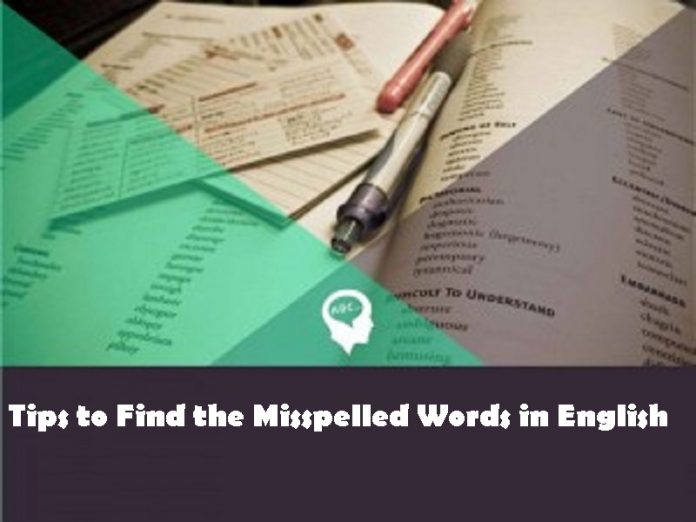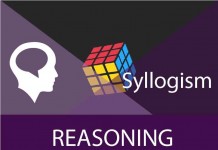Tips to Find the Misspelled Words in English
Hello Sehpaathians,
As it has been seen that in SBI Clerk Prelims 5 marks questions will be asked on Misspelled Words in English.So, we are here with the easy tips so that you can find the spelling error.
The most effective way of learning spelling of words is personal word power list. First, find out the reason why you are misspelling the words. Note them, correct them and keep them in mind. Suppose when you come across misspelling of a word then follow these steps.
Speed Reading in English Comprehension- The way Toppers do it!
Easy Tips to find the Opposite meaning word in English Vocabulary
- Note the misspelled word.
- Write the correct spelling of the misspelled word.
- Make a note of why you have misspelled the word.
- Note the meaning of the word. (make a description of the word)
- Write a new sentence using the word. And you can overcome misspelling the words, so that you can spell the words correctly which are alike.
How to spell words Correctly
Rule 1: “ I before E except after C”
This rule, designed to help us remember how to spell words such as receive and chief, seems so promising in its simplicity at first.
- Achieve, believe, bier, brief, hygiene, grief, thief, friend, grieve, chief, fiend, patience, pierce, priest.
- Ceiling, conceive, deceive, perceive, receipt, receive, deceit, conceit. But then things get complicated; it doesn’t work with words pronounced “ay” as in neighbor, freight, beige, sleigh, weight, vein, and weigh and there are many exceptions to the rule: either, neither, feint, foreign, forfeit, height, Ieisure, weird, seize, and seizure. Still, the rule is relatively simple and worth remembering.
Rule2: “ Dropping Final E”
When adding an ending to a word that ends with a silent e, drop the final e if the ending begins with a vowel:
- Advancing
- Surprising
However, if the ending begins with a consonant, keep the final e:
- Advancement
- Likeness
(However, if the silent e is preceded by another vowel, drop the e when adding any ending: argument, argued, truly.)
How to approach spotting error question in banking exam?
Exceptions: to avoid confusion and mispronunciation, the final e is kept in words such as mileage and words where the final e is preceded by a soft g or c: changeable, courageous, manageable, management, noticeable. (The word management for example, without that e after the g, would be pronounced with a hard g sound.)
Rule 3: “Dropping Final Y”
When adding an ending to a word that ends with y, change the y to I when it is preceded by a consonant.
- Supply becomes supplies
- Worry becomes worried
- Merry becomes merrier
How to excel your score in SBI clerical 2016 prelims
This does not apply to the ending –ing, however.
- Crying
- Studying
Nor does it apply when the final y is preceded by a vowel.
- Obeyed
- Saying
Rule 4: “Doubling Final Consonants”
When adding an ending to award that ends in a consonant, we double that consonant in many situations. First, we have to determine the number of syllables in the word.
Complete study material for English language practice
How to Improve scores in English language
Double the final consonant before adding an ending that begins with a vowel when the last syllable of the word is accented and that syllable ends in a single vowel followed by a single consonant.
- Submit is accented on the last syllable and the final consonant is preceded by a vowel, so we double the t before adding, for instance, an – ing or –ed: submitting, submitted.
- Flap contains only one syllable which means that it is always accented. Again, the last consonant is preceded by a vowel, so we double it before adding, for instance, an –ing or –ed: flapping, flapped. This rule does not apply to verbs that end with “x”, “w”, “v”, and “y”. consonants that cannot be doubled (such as “box” [boxing] and “snow” [snowing]).
- Open contains two syllables and the last syllable is preceded by a single vowel, but the accent falls on the first syllable, not the last syllable, so we don’t double the n before adding an ending: opening, opened.
- Refer contains two syllables and the accent falls on the last syllable and a single vowel precedes the final consonant, so we will double the r before adding an ending, as in referring, referral. The same would apply to begin, as in beginner, beginning.
- Relent contains two syllables, but the final consonant is preceded by another consonant, not a vowel, so we do not double the t before adding an ending: relented, relenting.
- Deal looks like flap (above), but the syllable ends in a consonant preceded not by a single vowel, but by two vowels, so we do not double the final I as in dealer and dealing. The same would apply, then, to despair: despairing, despaired.
Rule 5: “Adding prefixes”
Generally, adding a prefix to a word does not change its spelling. For some reason, the word misspelling is one of the most often misspelled words in English. See the material on adding prefixes in the section on Vocabulary. See, also, the section on the creation and spelling of compound Nouns and Modifiers.
- Unnecessary, dissatisfied, disinterested, misinform
Tips to spell words correctly
- Take the letters in the word and write a sentence with each of them. For example, you could learn to spell “arithmetic” with the sentence “A rat in the house might eat the ice cream.”
- Proofread your work. We all get busy at some point during writing, which makes it easy to toss in a sound alike word such as reef or wreath; and you can carry on that mistake unaware that a mistake has been made…. Until later and it jumps out at you…. Then you are like, “wow, I wrote that?
- Check compound words in a dictionary. There is really no way to know whether to write “stomachache,” “stomach ache”or“stomach aches” unless you consult a dictionary.
- Reading books and newspapers, catalogues, billboard signs, poster in windows all aid in learning how to spell. If you find a word that is not familiar, write it down, even if all you have is paper napkin. When you go home, look up the word or words in the dictionary. The more you reference, the more you read, the better you will be at spelling.
- It can really help to be familiar with the spelling of a few other languages, and to know that the language that the word comes from.
- Don’t be afraid to use the dictionary. English words come from many different languages. A good dictionary can tell you where the word is from, and when you begin to learn them you will begin to recognize patterns.



















